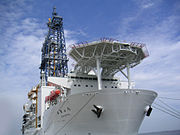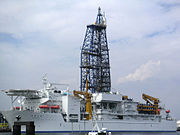Integrated Ocean Drilling Program: Difference between revisions
Appearance
Content deleted Content added
No edit summary |
No edit summary |
||
| Line 19: | Line 19: | ||
|} |
|} |
||
<h2>Focus on Earth<h2/> |
<h2>Focus on Earth<h2/> |
||
IODP scientists pursue new knowledge about Earth’s past to meet today’s global challenges. Two previous scientific ocean drilling programs generated abundant information about Earth’s dynamic nature: tectonic processes, ocean circulation, climate change, continental rifting, and ocean basin formation. Today, scientific ocean drilling continues to provide a powerful tool to study the critical processes related to Earth’s short-term change and long-term variability. IODP expands the scope of ocean drilling investigations, and pushes the limits of technology by providing diversedrilling platforms to meet specific requirements of each planned drilling project. |
IODP scientists pursue new knowledge about Earth’s past to meet today’s global challenges. Two previous scientific ocean drilling programs generated abundant information about Earth’s dynamic nature: tectonic processes, ocean circulation, climate change, continental rifting, and ocean basin formation. Today, scientific ocean drilling continues to provide a powerful tool to study the critical processes related to Earth’s short-term change and long-term variability. IODP expands the scope of ocean drilling investigations, and pushes the limits of technology by providing diversedrilling platforms to meet specific requirements of each planned drilling project<br/>. |
||
<br |
<br>IODP focuses on ocean basins—rich archives and ideal natural laboratories—to study the interdependence of physical, chemical, and biologicalprocesses. IODP research also centers on those factors that control climate change, the vast circulation of fluids within Earth’s crust,the nature of life on and within Earth, and the dynamics of lithospheric formation and recycling.<br/> |
||
<br |
<br>IODP was conceived as a 10-year Earth science and research program that started in 2003. Its prescribed drilling activities require weeks,sometimes months of drilling at a single location, a variety of drilling hardware, new engineering strategies to ensure pristine samples,and ventures into harsh and demanding environments. Despite the achievements made during the past 40+ years ofocean drilling activity, IODP continues to pioneer research in “inner space,” investigating expansive, deep subseafloor environments that retain their scientific intrigue well into the 21st century.<br/> |
||
<br |
<br>Participating organizations include: ODP Management International, Inc., Joint Oceanographic Institutions, Inc., [[Lamont-Doherty Earth Observatory]] of [[Columbia University]], [[Texas A&M University]], and Texas A&M Research Foundation. |
||
==References== |
==References== |
||
Revision as of 15:05, 9 October 2008
This article needs to be updated. |
 |
| Deep-sea Drilling Vessel "CHIKYU" |
The Integrated Ocean Drilling Program (IODP) is an international marine research drilling program dedicated to advancing scientific understanding of the Earth by monitoring and sampling subseafloor environments. Through multiple platforms—a feature unique to IODP— the world’s preeminent scientists explore the deep biosphere and subseafloor; environmental change; Earth processes and effects; and solid earth cycles and geodynamics; principal program themes.
IODP: Investigating Earth, Oceans, and Life
The Integrated Ocean Drilling Program (IODP) brings together hundreds of scientists from dozens of countries and scientific disciplines to conduct cutting-edge investigations of Earth deep below the seafloor. For each drilling project undertaken, IODP employs the best-suited drilling platform available along with complementary drilling tools and technologies. IODP affords scientists the opportunity to:
1. recover geological records and rock samples.
2. investigate and document ocean and climate change through time.
3. explore the presence of primitive life below the seafloor.
4. verify remote, near-seafloor observatories.
5. gain understanding of how tectonic plates move and recycle themselves into Earth’s deep mantle.
Focus on Earth
IODP scientists pursue new knowledge about Earth’s past to meet today’s global challenges. Two previous scientific ocean drilling programs generated abundant information about Earth’s dynamic nature: tectonic processes, ocean circulation, climate change, continental rifting, and ocean basin formation. Today, scientific ocean drilling continues to provide a powerful tool to study the critical processes related to Earth’s short-term change and long-term variability. IODP expands the scope of ocean drilling investigations, and pushes the limits of technology by providing diversedrilling platforms to meet specific requirements of each planned drilling project
.
IODP focuses on ocean basins—rich archives and ideal natural laboratories—to study the interdependence of physical, chemical, and biologicalprocesses. IODP research also centers on those factors that control climate change, the vast circulation of fluids within Earth’s crust,the nature of life on and within Earth, and the dynamics of lithospheric formation and recycling.
IODP was conceived as a 10-year Earth science and research program that started in 2003. Its prescribed drilling activities require weeks,sometimes months of drilling at a single location, a variety of drilling hardware, new engineering strategies to ensure pristine samples,and ventures into harsh and demanding environments. Despite the achievements made during the past 40+ years ofocean drilling activity, IODP continues to pioneer research in “inner space,” investigating expansive, deep subseafloor environments that retain their scientific intrigue well into the 21st century.
Participating organizations include: ODP Management International, Inc., Joint Oceanographic Institutions, Inc., Lamont-Doherty Earth Observatory of Columbia University, Texas A&M University, and Texas A&M Research Foundation.
References
External links

